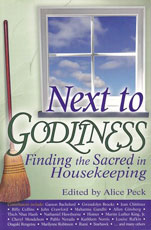"I think chores can be a form of prayer. I also think, after reading the heaviest tomes in the divinity library, that elaborate sets of chores — spring cleaning, for example — can be a form of ritual. We're used to thinking of ritual as a stiffly ceremonial event at which one sits, stands and kneels with docility, hoping to please the supernatural. But the strongest rituals reveal the sacredness of the ordinary, using particular actions in particular ways to extract its deeper meanings. I don't want to overstate this. Not every plate of pasta is a ritual sacrifice. But the first meal you make for your future spouse certainly is.
"Ritual can be defined broadly — as just about every expressive human act — or narrowly, as what happens on a marble altar. But in the middle, where sacred and secular meet, ritual experts look for three qualities: formality, fixity and repetition. If you doubt their presence in the domestic sphere, try skipping the laundry for a few weeks. Or watch what happens when another family member volunteers — and does it differently.
"Over years of living, a family's housework takes on definite shapes. There are rites of purification: the dishes, the laundry, the dusting and polishing. There are rites of passage: We cross the boundaries of the home with groceries and garbage. We make home a refuge, then sweep a threshold to the outside world. There are rites of transformation (grinding grain and baking bread, changing grain into food, which would then become flesh, was a religious ritual even in the Paleolithic era).
"Finally and most obviously, there are rites of incorporation. Scarfing down our daily bagel, we forget what a powerful transaction the domestic act of sustenance can be. Food gives us strength, continuity, reassurance; it mediates between our vulnerable insides and the outside world, between what is self and what is other. Who fixed the meal and how long it took, who carves, who gets the icing roses, who refuses helpings and why, who scrapes the dishes — all these carry messages of affection or estrangement, power or oppression, contentment or rebellion.
"I've not gone so far as spirituality author Thomas Moore, who insists 'there are gods of the house' and 'to them, a scrub brush is a sacramental object.' When you're exhausted after a day in the outside world, a scrub brush is a burdensome collector of hair and dead skin, nothing more. What has changed, for me, is the sense of possibility. I spent my formative years jotting down poetic comments about the theology of paradox. But it never occurred to me to seek spirit in the earthiest, dullest, most repetitive chores I knew."
